Until Then review - friendships, fears, and Filipinos
Pinoy Pride intensifies.
While the setting and inspirations are Filipino through and through, the themes of friendship, love, loss, and acceptance in this visual novel are universal.
"Kung sakaling mapadaan baka ikaw ay aking tawagan, dahil minsan tayo ay naging tunay na magkaibigan" ("I might call you if ever I'm in the area, since there was a time when we were the best of friends"). The lyrics to "Minsan," a song by legendary Pinoy band Eraserheads, kept playing in my head while I was reviewing Until Then. This visual novel from Polychroma Games presents a coming-of-age story, a tale of love and loss, friendships and fears, all sprinkled with life from my country: the Philippines. It's enough to make me reminisce about my student years and sing the national anthem.
Until Then's narrative tells of The Ruling, a catastrophe that has caused disasters worldwide. On top of that, there's an unexplained phenomenon in which people suddenly disappear, while others confuse events from the future and events that have already happened.
It's interesting stuff, but these supernatural elements would be all for nothing without a memorable cast of characters, starting with the protagonist Mark. He's a 15-year-old bright-but-lazy slacker, just making his way through high school while his Overseas Filipino Worker (OFW) parents are abroad. Right from the get-go, I felt a personal connection: I grew up in the province of Batangas, raised by my "ninang" (godmother) who eventually became an OFW in Saudi Arabia. Likewise, I've had my fair share of scholarships and suspensions over two decades ago when I was still a student. Just like Mark, I'd cram before exams, get sent to the principal's or prefect's office, and sleep during class hours (sometimes due to boredom and sometimes due to Red Horse beer).
Alongside his loyal classmates and friends, Cathy, Ridel, and Louise, Mark yearns for a spark, something to inspire him to continue with the humdrum rhythm of his daily routine. Then a mishap leads to a chance meeting with Nicole, a transfer student. It's this encounter that slowly builds to a budding romance. Young love!
We've all been there, I think. We've all had our share of anxiety and awkwardness as we've navigated the social minefield that is high school - and perhaps even college. It's this premise that makes the formative interactions among Mark and his friends relatable. You've got everything from hanging out in convenience stores and joining extracurricular clubs, to being invited to someone's house to meet the family. You've got endless chatting until the wee hours of the night, and the process of starting to understand one's gender identity. There were enough "kilig" moments (romantic elation or excitement) at certain points, too, that I found myself rooting for the characters.
The experience of being a student is complemented by the inclusion of smartphone and social media mechanics, in which you receive messages from classmates and choose from various preset replies. Even better, you can click on profiles, like posts, and read linked articles for a bit of backstory. The mechanic is quite clever, providing enough information to go by without necessarily bogging you down with too much exposition.
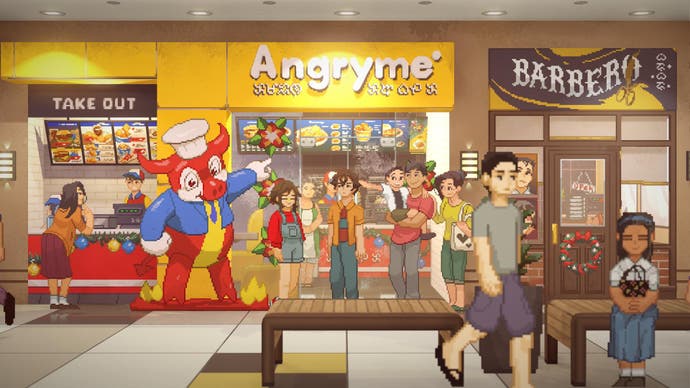
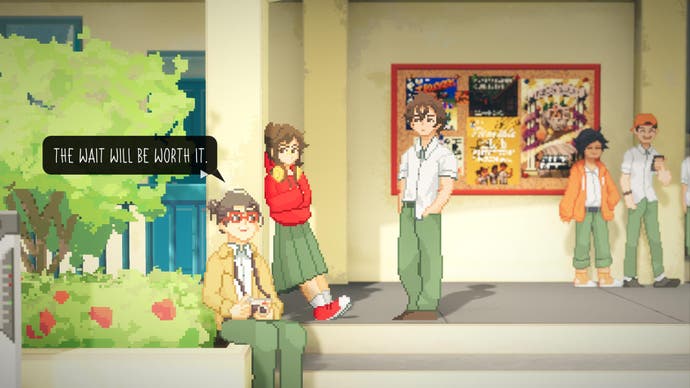
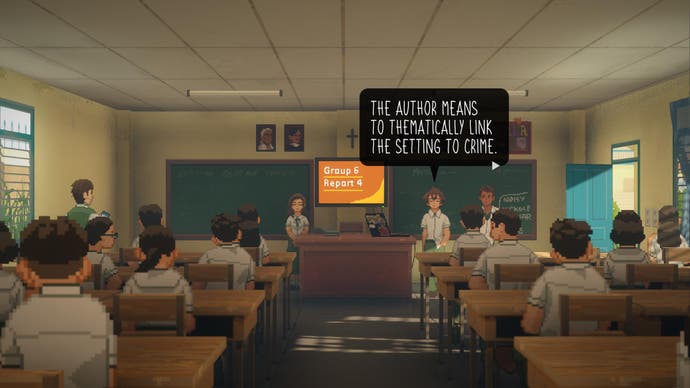
Until Then also touches on the effects of depression and the mask we wear to hide our deepest fears, our biggest regrets, and our darkest traumas. These dilemmas are handled with mindfulness and nuance, juxtaposed with the universal theme of finding hope, humour, and resilience. All of this is presented in lovely pixel art visuals, interspersed with anime-esque snapshots. Meanwhile, haunting and melodramatic music adds to the emotional punch, and even made me tear up at certain points.
I completed Until Then's campaign in roughly nine hours, initially thinking that some of the main plot points were unresolved or only served to detract from the game's pacing. Little did I know that more surprises - and answers - awaited me on my next playthrough. These developments and reveals are nothing short of captivating and you must not miss them. Without spoiling too much, let's just say that you need to continue your playthrough when prompted by the game. (Perhaps my only complaint here is that the game uses a single autosave system; quitting before the next autosave or encountering a crash means having to replay that entire portion.)
Until Then's smart and creative storytelling is further enriched by Filipino-inspired themes, locations, and settings. The game wears its Pinoy Pride badge on its sleeve, and Polychroma Games is eager to showcase the Philippines to a wider audience. This is full-on Pinoy representation, the likes of which hasn't been seen since 2003's Anito: Defend a Land Enraged. (Sorry, Josie Rizal, Talim, Conduit, Neon, and the Wanzer pilots in Taal Base, I know you did your best for our people.)
As someone who's lived in the Philippines his entire life, I couldn't help but smile whenever I saw nods to Filipino culture and traditions, such as Mark receiving remittances from his OFW father, parodies of business names like Timedome (Timezone) and Angryme (Jollibee), paying the jeepney fare and haggling with a tricycle driver, a surprisingly uncrowded MRT/LRT station, painted chicks (yes, we have those), and even dining rooms with adobo, menudo, pork sisig, lechon, lots of rice, and giant wooden utensils hanging on the walls. Additionally, there are many Filipino nicknames, surnames, spoken words and graffiti scribbled at street corners. It's very lovingly done.
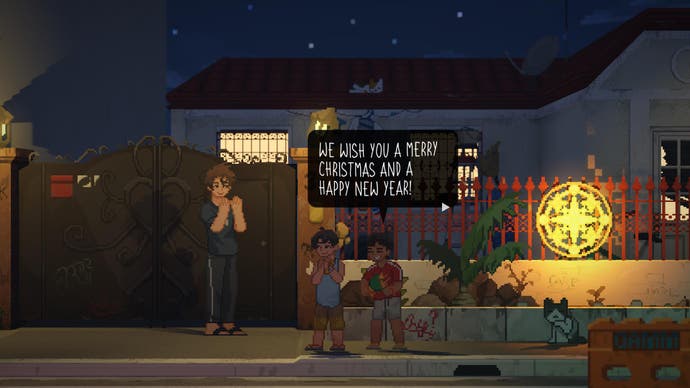
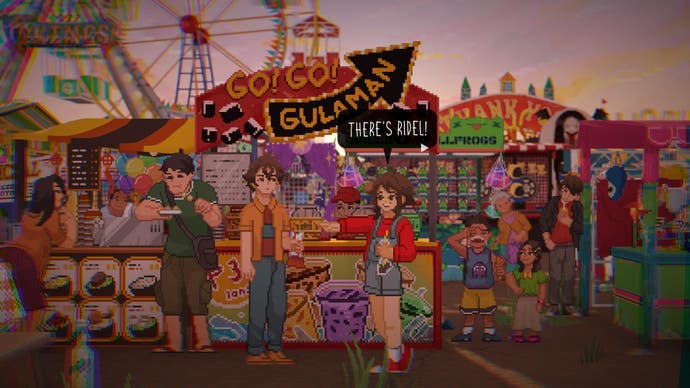
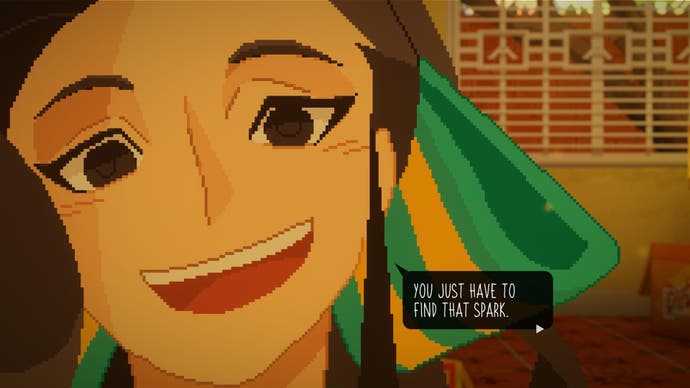
Liamson Integrated School, meanwhile, has classrooms with portraits of heroes Jose Rizal and Andres Bonifcaio, along with a common section theme (i.e. 9 Perla or Grade 9 - Pearl), where students wear the usual types of school uniforms (we mostly have either black or khaki pants for boys but I'll give this oversight a pass). The game's town also has a theme park with a caterpillar ride, gulaman vendor, rice bowls, coin toss and bingo games, a haunted house area, and a "Vikings" attraction.
By the same token, there are numerous nods to local pop culture and politics. There's a meme of "Sarah, Ang Munting Prinsesa'' on an in-game social network, and a character talks about a convoluted plot twist involving a certain "Cardo," an immortal policeman from a TV series. I opened balikbayan boxes that contained pirated DVDs, including the "Sardyant Benny" movie (aka. "Praybeyt Benjamin") and "Boom Boom Pak XIV" (said to have 69 famous stars but absolutely no plot whatsoever), before passing by people gossiping at a street, one of whom was named "Marites" (a slang term we use for those who love to gossip all day).
There's even a waiting shed made by "Governor Kupit," a tongue-in-cheek criticism of government corruption and the tendency of politicians to announce every project they approve, as well as a "President Cojuangco." Several Steam achievements are also nods to things Pinoys would be aware of, such as "Anong Gentle Gentle?" and "Isang Daang Porsyentong Lakas," iconic lines and a viral video based on the Toguro battle in Yu Yu Hakusho (known as Ghost Fighter here).
Even the minigames in Until Then are derived from daily life in the Philippines, including one in which you have to skewer fish balls with a stick and a videoke machine that's more akin to a rhythm game. (Too bad the only playable song is "Auld Lang Syne." The moment I saw a videoke machine, I had desperately hoped there'd be something from Basil Valdez, Rivermaya, or Eraserheads.)
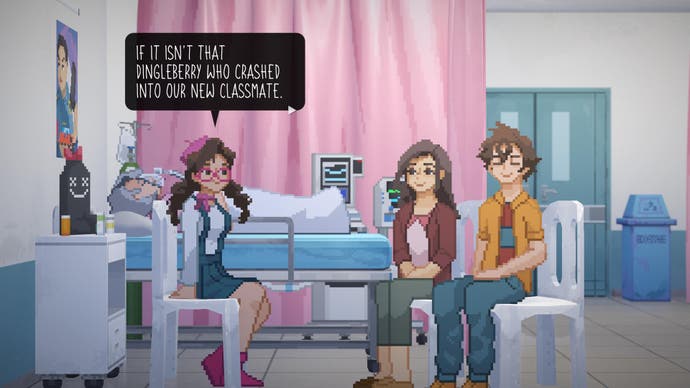
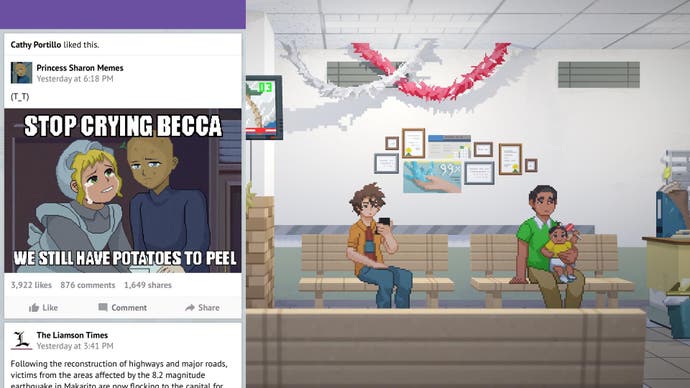
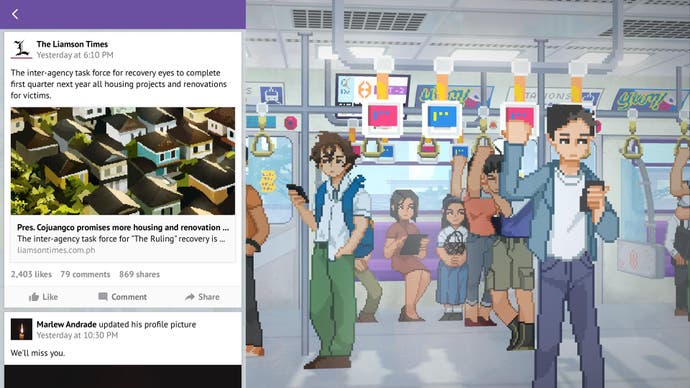
Perhaps my only gripe with Until Then's showcasing of Filipino culture is that most of the writing is purely in English. While English is one of the Philippines' official languages, it's more commonly used in hybridised form: Taglish (a lot of Tagalog and just a smattering of English words). Given that Tagalog and other local dialects are expressive and blunt, with an added "oomph," if you will, statements can sometimes lose their meaning or sound too corny or literal when characters resort to using more "Western" terms instead of the local vernacular.
I was surprised when a character said that Mark was "a looker," rather than referring to him as "pogi" or "gwapings," for example. Similarly, a string of bad luck caused someone to mention that "a black cat was on their tail," as opposed to "may balat ka sa pwet" ("you have a birthmark on your arse"). Characters even used terms and phrases like "doofus," "dingleberry," "smartypants," "channelling your inner Pollock," "party pooper," and the like. I felt a certain disconnect, as a Filipino, since these were things my people wouldn't say out loud for fear of losing our citizenship. (At one point, I prayed for someone to say "E0w p0wz! Jejeje!" if only to make it seem as though I was still seeing a regular conversation among Pinoys.)
Subtitled words/phrases or floating text would've been welcome features, helping non-native speakers understand our own interactions and slang. As stated by legendary rapper Francis Magalona (and tweaked by me): "Tayo'y mga Pinoy; tayo'y hindi 'Kano. Huwag kang mahihiya, maliban na lang kung may tinawag kang dingleberry." ("We're Filipinos; we're not Americans. Don't be embarrassed, unless you use the term 'dingleberry.'")
Overall, Until Then manages to weave a moving coming-of-age story, all while putting Filipino culture front and centre. Though some subplots are meandering at first and minigames are relatively simple, you're pulled in nonetheless thanks to its engaging use of in-game social network mechanics, the deepening bonds among characters, and the astounding late-game reveals. And all of it in search of that spark that we need in order to carry on.
A copy of Until Then was provided for review by Maximum Entertainment.

